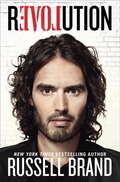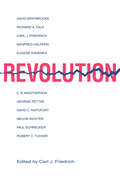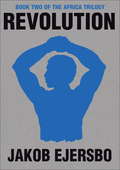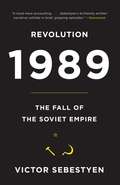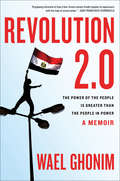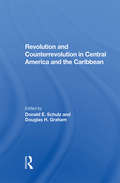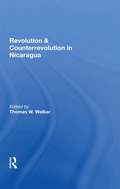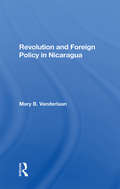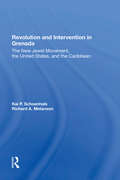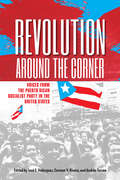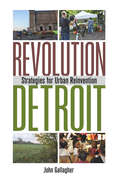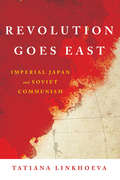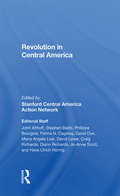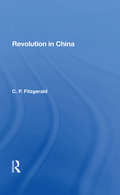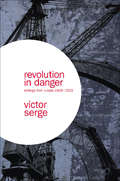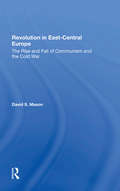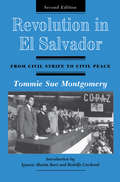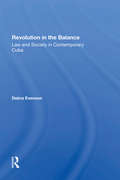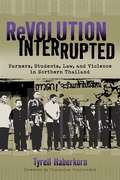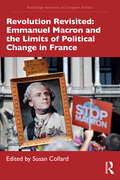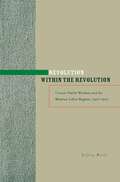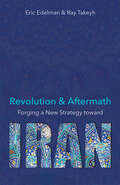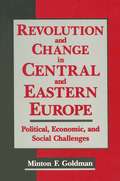- Table View
- List View
Revolution
by Russell BrandNATIONAL BESTSELLERWe all know the system isn't working. Our governments are corrupt and the opposing parties pointlessly similar. Our culture is filled with vacuity and pap, and we are told there's nothing we can do: "It's just the way things are." In this book, Russell Brand hilariously lacerates the straw men and paper tigers of our conformist times and presents, with the help of experts as diverse as Thomas Piketty and George Orwell, a vision for a fairer, sexier society that's fun and inclusive. You have been lied to, told there's no alternative, no choice, and that you don't deserve any better. Brand destroys this illusory facade as amusingly and deftly as he annihilates Morning Joe anchors, Fox News fascists, and BBC stalwarts. This book makes revolution not only possible but inevitable and fun.
Revolution (Nomos Ser. #No. 8)
by Carl J. FriedrichProfessor C.E. Black of Princeton University called this "a valuable contribution to our understanding of the revolutionary movements that are now a worldwide phenomenon. It includes thoughtful essays on many varieties of revolution, considered in the light both of past developments and future prospects. The twentieth century was an age of revolution. Over many areas of the world the two great ideologies of nationalism and communism spawned violent upheavals, often differing in form but aiming at the transformation of the existing order by means of coups d'etat, revolutions, and "wars of national liberation." Eleven distinguished political scientists and policy theorists offer a penetrating analysis of the theoretical and substantive aspects of revolution. Their scholarly, lucid, and well-balanced essays explore the revolutionary theories and experience of several centuries and apply them to the most crucial problem of this century. Carl J. Friedrich argues that it is the failure of government, which is at the core of the political revolution, and shows that constitutional regimes that have allowed "little revolutions" promoting gradual political and social change have been singularly free of revolutionary upheaval. Presenting the thinking of some of the best minds of the 20th century, this volume offers important guideposts for the future study of the etiology of revolutions. Here are not mere speculative and historical distillations, but new insights and conclusions regarding the origin, purpose, and impact of revolution on the world of today and tomorrow. An indispensable work for every student and scholar of comparative politics, international relations, and the history and theory of Communism, it will also be welcomed by the statesman and the educated layman who want to probe the causes of the historical upheavals of our time.
Revolution (The Africa Trilogy)
by Jakob EjersboRevolution is a collection of eleven short stories that act as a vital bridge between the novels Exile and Liberty. But it is also so much more than that. Ejersbo had a remarkable and unaffected talent for getting inside the heads of his characters: Moses, a worker in a Tanzanite mine who lives in hope of striking it rich; Sofie, a Greenlander who joins a French conman on his trip around the world; Rachel, who tries to make a life for herself in a city where everyone sees her as a whore in waiting. You feel that Ejerbso could have written from the heart of every person living in Tanzania; and that you could go on reading them forever.
Revolution 1989: The Fall of the Soviet Empire
by Victor SebestyenRevolution 1989 is the first in-depth, authoritative account of a few months that changed the world. At the start of 1989, six European nations were Soviet vassal states. By year's end, they had all declared national independence and embarked on the road to democracy. How did it happen so quickly? Victor Sebestyen, who was on the scene as a reporter, draws on his firsthand knowledge of the events, on scores of interviews with witnesses and participants, and on newly uncovered archival material. He tells the story through the eyes of ordinary men and women as well as through the strategic moves of world leaders. He shows how the KGB helped bring down former allies; how the United States tried to slow the process; and why the collapse of the Iron Curtain was the catalyst for the fall of the entire Soviet empire.
Revolution 2.0: The Power of the People Is Greater Than the People in Power, A Memoir (Playaway Adult Nonfiction Ser.)
by Wael GhonimThe former Google executive and political activist tells the story of the Egyptian revolution he helped ignite through the power of social media. In the summer of 2010, thirty-year-old Google executive Wael Ghonim anonymously launched a Facebook page to protest the death of an Egyptian man at the hands of security forces. The page&’s following expanded quickly and moved from online protests to a nonconfrontational movement. On January 25, 2011, Tahrir Square resounded with calls for change. Yet just as the revolution began in earnest, Ghonim was captured and held for twelve days of brutal interrogation. After he was released, he gave a tearful speech on national television, and the protests grew more intense. Four days later, the president of Egypt was gone. In this riveting story, Ghonim takes us inside the movement and shares the keys to unleashing the power of crowds in the age of social networking. &“A gripping chronicle of how a fear-frozen society finally topples its oppressors with the help of social media.&” —San Francisco Chronicle &“Revolution 2.0 excels in chronicling the roiling tension in the months before the uprising, the careful organization required and the momentum it unleashed.&” —NPR.org
Revolution And Counterrevolution In Central America And The Caribbean
by Donald E Schulz Douglas H GrahamA detailed examination of the roots of revolution and counterrevolution in Central America and the Caribbean, this book draws on the research of an interdisciplinary team of noted scholars. The authors give special attention to the institutional and structural causes of stability and instability—in particular, the traditional role of the United States; the current economic crisis; the changing role of the Roman Catholic church; the influence of the military and security forces, the oligarchy, and the business sector; the problems of instituting socioeconomic reform; the politics of subsistence; and the revolutionary opposition. Following the thematic chapters, a country-by-country focus is employed to assess the situations in El Salvador, Guatemala, Nicaragua, Honduras, Costa Rica, and Jamaica, and a section devoted to the international dimensions of the crisis looks at Mexican, Soviet, Cuban, and U.S. policies toward the region, The editors' concluding chapter explores prospects for the future of this troubled area.
Revolution And Counterrevolution In Nicaragua
by Thomas W WalkerA comprehensive overview of the Sandinista revolution in Nicaragua, this book offers an interdisciplinary study of the domestic and foreign challenges that faced the Sandinista government during its ten years in power. Based on extensive research in Nicaragua during the revolution, the essays examine important aspects of both the revolution and the U.S.-orchestrated counterrevolution that brought it to an end. After an introduction to the historical background of the revolutionary period, contributors offer an overview of specific groups and institutions within the revolution, such as women, grass-roots organizations, and the armed forces, and provide a balanced assessment of Sandinista public policy and performance in such areas as agrarian reform, health care, education, and housing. The impact and implications of the contra war, financed by the United States, are also analyzed, as well as efforts made over the years to promote a negotiated peace.
Revolution And Foreign Policy In Nicaragua
by Mary VanderlaanSince the revolution in 1979, Nicaragua has faced economic dislocation, a growing debt, chronic hard currency shortages, a counter-revolutionary war, economic and diplomatic pressure from the US, and regional isolation. In spite of these challenging problems, the Sandinista leadership, maintaining a broad array of international contacts, continues
Revolution And Intervention In Grenada: The New Jewel Movement, The United States, And The Caribbean
by Kai Schoenhals Richard MelansonIn Part 1 of this book, Dr. Schoenhals places the Grenadian Revolution and its aftermath in historical perspective. He explores the Anglo-French rivalry over the island, the period of slavery, and the British colonial administration and gives particular emphasis to the Gairy decades (1951-1979). His discussion of the People's Revolutionary Government is based on extensive Interviews with the leadership of the New Jewel Movement, foreign diplomats, and Grenadian citizens, and on a review of documents captured by the United States during occupation of the island. In Part 2, Dr. Melanson, after briefly reviewing the nature of U.S. interests In the region and U.S.-Caribbean relations during the Nixon years, focuses on the Carter and Reagan administrations' policies in the Caribbean and relations with the Grenadian government. He examines the justification offered by President Reagan for the 1983 intervention, domestic responses to the action in the United States, and its implications for Reagan's Central American policies. Finally, he considers whether the action will prove to be a prelude to a new domestic consensus about the use of U.S. military power in the Third World.
Revolution And Transition In East-central Europe: Second Edition (Dilemmas in World Politics )
by David MasonEastern and Western Europe continue to change in their relationship to one another and in their ongoing dynamic with the post-Soviet states. Economic development, electoral upheaval, and the Bosnian crisis all color the transition from communism to democracy and from a Cold War outlook to a new global order still taking shape.In this fully revised and updated edition of his popular and critically acclaimed text, David Mason brings the revolutionary events of 1989 into context with the transitional yet turbulent 1990s. We see new parties, new politics, new constitutions, and new opportunities in light of economic shock therapies, ?left turns? in recent elections, and dissolving sovereignties and alliances. Despite savage ethnic conflict, economic scarcity, and political insecurity, Mason shows us that East-Central Europe is consolidating and reemerging as a region to be reckoned with on the global stage.
Revolution Around the Corner: Voices from the Puerto Rican Socialist Party in the U.S.
by José E. Velázquez, Carmen V. Rivera, and Andrés TorresActive from the late 1960s until the mid-1990s, the U.S. branch of the Puerto Rican Socialist Party (PSP) worked simultaneously to build support for Puerto Rican independence and to engage in radical social change within the United States. Revolution Around the Corner chronicles this unique social movement, describing various mass campaigns and the inner workings of the organization. The editors and contributors—all former members, leaders, and supporters of the PSP—offer a range of views and interpretations of their experience. Combining historical accounts, personal stories, interviews, and retrospective analysis, Revolution Around the Corner examines specific actions such as the National Day of Solidarity (El Acto Nacional), the Bicentennial without Colonies, the Save Hostos struggle, and the Vieques campaign. Testimonies recount the pros and cons of membership diversity, as well as issues of loyalty and compañerismo. In addition, essays describe the PSP’s participation in coalitions and alliances with Left and progressive movements. The book concludes with the editors’ reflections on the PSP’s achievements, mistakes, and contributions.
Revolution Detroit: Strategies for Urban Reinvention
by John GallagherAfter decades of suburban sprawl, job loss, and lack of regional government, Detroit has become a symbol of post-industrial distress and also one of the most complex urban environments in the world. In Revolution Detroit: Strategies for Urban Reinvention, John Gallagher argues that Detroit's experience can offer valuable lessons to other cities that are, or will soon be, dealing with the same broken municipal model. A follow-up to his award-winning 2010 work, Reimagining Detroit, this volume looks at Detroit's successes and failures in confronting its considerable challenges. It also looks at other ideas for reinvention drawn from the recent history of other cities, including Cleveland, Flint, Richmond, Philadelphia, and Youngstown, as well as overseas cities, including Manchester and Leipzig. This book surveys four key areas: governance, education and crime, economic models, and the repurposing of vacant urban land. Among the topics Gallagher covers are effective new urban governance models developed in Cleveland and Detroit; new education models highlighting low-income-but-high-achievement schools and districts; creative new entrepreneurial business models emerging in Detroit and other post-industrial cities; and examples of successful repurposing of vacant urban land through urban agriculture, restoration of natural landscapes, and the use of art in public places. He concludes with a cautious yet hopeful message that Detroit may prove to be the world's most important venue for successful urban experimentation and that the reinvention portrayed in the book can be repeated in many cities. Gallagher's extensive traveling and research, along with his long career covering urban redevelopment for the Detroit Free Press, has given him an unmatched perspective on Detroit's story. Readers interested in urban studies and recent Detroit history will appreciate this thoughtful assessment of the best practices and obvious errors when it comes to reinventing our cities.
Revolution Goes East: Imperial Japan and Soviet Communism (Studies of the Weatherhead East Asian Institute, Columbia University)
by Tatiana LinkhoevaRevolution Goes East is an intellectual history that applies a novel global perspective to the classic story of the rise of communism and the various reactions it provoked in Imperial Japan. Tatiana Linkhoeva demonstrates how contemporary discussions of the Russian Revolution, its containment, and the issue of imperialism played a fundamental role in shaping Japan's imperial society and state.In this bold approach, Linkhoeva explores attitudes toward the Soviet Union and the communist movement among the Japanese military and politicians, as well as interwar leftist and rightist intellectuals and activists. Her book draws on extensive research in both published and archival documents, including memoirs, newspaper and journal articles, political pamphlets, and Comintern archives. Revolution Goes East presents us with a compelling argument that the interwar Japanese Left replicated the Orientalist outlook of Marxism-Leninism in its relationship with the rest of Asia, and that this proved to be its undoing. Furthermore, Linkhoeva shows that Japanese imperial anticommunism was based on geopolitical interests for the stability of the empire rather than on fear of communist ideology.Thanks to generous funding from New York University and its participation in TOME (Toward an Open Monograph Ecosystem), the ebook editions of this book are available as Open Access (OA) volumes, available from Cornell Open (cornellopen.org) and other Open Access repositories.
Revolution In Central America
by Philippe Bourgois David Lowe David Dye Stanford Central America Action Network John Althoff María Angela Leal Stephen Babb Craig Richards Fatma N. Çagatay Diann Richards Jo-Anne Scott Hans Ulrich HornigCentral America, though affected for decades by profound socioeconomic transformations, has been more or less quiescent politically. The sudden eruption of revolutionary turmoil in the region, as seen in recent events in Nicaragua, El Salvador, and Guatemala, has shattered the political status quo and cast Central America into the U.S. foreign poli
Revolution In China
by C. P. Fitzgerald C P FitzgeraldThis book, a study of revolution in China, considers movements of Western origin, such as Christianity or Communism, only as they appear in the Chinese context, treating them as integral factors in the Chinese revolutionary situation.
Revolution In Danger: Writings from Russia 1919–1921
by Victor SergeUpon arrival in Petrograd in 1919, Victor Serge - the great chronicler of the Russian Revolution - found a society nearly shredded to ribbons by civil war. In these essays he sketches a portrait of the darkest hours faced by the fledgling revolution, and defends the red terror against abstract criticisms as a regrettable, though unavoidable, product of horrible circumstances.
Revolution In East-central Europe: The Rise And Fall Of Communism And The Cold War
by David S MasonThe year 1989 marked a turning point in world history, a watershed year of unprecedented drama and political significance. No matter how one looks at those events–as the fall of communism, the democratization of Eastern Europe, or the end of the cold war–it is important to understand how the world travelled the distance of time, space, and ideology to arrive at the Berlin Wall and tear it down. David Mason provides that understanding in a concise synthesis of history, politics, economics, sociology, literature, philosophy, and popular, as well as traditional, culture. He shows how all these elements combined to yield the year that effectively closed the twentieth century–and promised to launch the new century on a hopeful note. Starting with Poland's elections in June 1989, the countries of then-communist Eastern Europe one by one revolutionized their governments and their polities; Hungary opened its borders to the West, East Germany rushed through, Czechoslovakia elected Vaclav Havel president, Bulgaria changed both party and leadership, and Romania executed Ceausescu. Although Gorbachev enabled many of these changes, he did not cause them. The illumination of the complex symbiosis between dynamics in Eastern Europe and the Soviet Union is one of the greatest contributions this book makes. With undercurrents emphasizing the power of ideas, the spirit of youth, and the multifaceted force of culture and ethnicity, Mason takes the reader far beyond the events of change and into their impetus and outcomes. He applies theories of social movements, democratization, and economic transition with an even hand, showing the interaction of their effects not only regionally but worldwide. The concluding chapter puts the revolutions in Eastern Europe into international perspective and highlights their impact on East-West relations, security alliances, and economic integration. Mason discusses the European Community, the United States and the Soviet Union, and the Third World in relation to the new East-Central European configuration. Using delightful and provocative cartoons from Eastern European and Soviet presses, interesting photos, valuable tables of data, and illuminating figures, Mason emphasizes important points about the role of nationalism, ethnicity, public opinion, and harsh economic reality in the revolutionary process.
Revolution In El Salvador: From Civil Strife To Civil Peace, Second Edition
by Tommie Sue MontgomerySince the first edition of this book appeared in 1982, El Salvador has experienced the most radical social change in its history. Ten years of civil war, in which a tenacious and creative revolutionary movement battled a larger, better-equipped, US-supported army to a standstill, have ended with 20 months of negotiations and a peace accord that promises to change the course of Salvadorean society and politics. This book traces the history of El Salvador, focusing on the oligarchy and the armed forces, that shaped the Salvadorean army and political system. Concentrating on the period since 1960, the author sheds new light on the US role in the increasing militarization of the country and the origins of the oligarchy-army rupture in 1979. Separate chapters deal with the Catholic church and the revolutionary organizations, which challenged the status quo after 1968. In the new edition, Dr Montgomery continues the story from 1982 to the present, offering a detailed account of the evolution of the war. She examines why Duarte's two inaugural promises, peace and economic prosperity could not be fulfilled and analyzes the electoral victory of the oligarchy in 1989. The final chapters closely follow the peace negotiations, ending with an assessment of the peace accords, and evaluate the future prospects for El Salvador and for the 1994 elections.
Revolution In The Balance: Law And Society In Contemporary Cuba
by Debra EvensonThis book is the product of more than four years' work, during which I receivedthe generous help and support of many friends and colleagues both inthe United States and in Cuba. I express my special gratitude to Raul GomezTreto and Emilio Marill Rivero for opening their libraries to me and for theirvaluable insights and suggestions. To the librarians at the Supreme Court ofCuba, the National Union of Cuban Jurists and the DePaul University Collegeof Law for their help in finding materials. To the National Union of CubanJurists, especially Magali Rojas and Rosario Fernandez, for doing somuch to facilitate my research in Cuba. To my research assistants StacyPochis, Tracy McGonigle and Lisa Acevedo for their painstaking work trackingdown information. To those who read drafts and provided critical comments,especially Jules Lobel, Carole Travis, Esther Mosak and MarcPoKempner. To Bill Montross for doing the copyediting. To DePaul Universityand Dean John Roberts of the College of Law for their support of thisproject from its inception and for providing funding for the research.
Revolution Interrupted
by Tyrell HaberkornIn October 1973 a mass movement forced Thailand's prime minister to step down and leave the country, ending nearly forty years of dictatorship. Three years later, in a brutal reassertion of authoritarian rule, Thai state and para-state forces quashed a demonstration at Thammasat University in Bangkok. InRevolution Interrupted, Tyrell Haberkorn focuses on this period when political activism briefly opened up the possibility for meaningful social change. Tenant farmers and their student allies fomented revolution, she shows, not by picking up guns but by invoking laws-laws that the Thai state ultimately proved unwilling to enforce. In choosing the law as their tool to fight unjust tenancy practices, farmers and students departed from the tactics of their ancestors and from the insurgent methods of the Communist Party of Thailand. To first imagine and then create a more just future, they drew on their own lived experience and the writings of Thai Marxian radicals of an earlier generation, as well as New Left, socialist, and other progressive thinkers from around the world. Yet their efforts were quickly met with harassment, intimidation, and assassinations of farmer leaders. More than thirty years later, the assassins remain unnamed. Drawing on hundreds of newspaper articles, cremation volumes, activist and state documents, and oral histories, Haberkorn reveals the ways in which the established order was undone and then reconsolidated. Examining this turbulent period through a new optic-interrupted revolution-she shows how the still unnameable violence continues to constrict political opportunity and to silence dissent in present-day Thailand.
Revolution Revisited: Emmanuel Macron and the Limits of Political Change in France (Routledge Advances in European Politics)
by Susan CollardThis book provides timely assessment of the extent to which Emmanuel Macron’s declared presidential goal – to bring in radical transformation of French politics, indeed a revolution, albeit a democratic one – has been achieved.This analysis of his presidency provides a framework for reflection on ‘immobilism’ in French politics, and how enduring transformation has remained much more elusive to most of those who promised it. With a wide a range of underlying, seemingly intractable and unresolved structural issues dominating French society, the book asks whether the young ‘disrupter’ has succeeded in reforming France where others had failed. What can we learn about the processes of political change from analysing Macron’s successes and failures in working through his ambitions for France?This book will be of key interest to scholars, students and followers of French politics/studies and society, gender studies, media studies and more broadly European studies.
Revolution Within the Revolution
by Jeffrey BortzMexico's revolution of 1910 ushered in a revolutionary era: during the twentieth century, Mexican, Russian, Chinese, Cuban, Nicaraguan, and Iranian revolutions shaped local, regional, and world history. Because Mexico was at the time a rural and agrarian country, it is not surprising that historians have concentrated on the revolution in the countryside where the rural underclass fought for land. This book uncovers a previously unknown workers' revolution within the broader revolution. Working in Mexico's largest factory industry, cotton textile operatives fought their own fight, one that challenged and overthrew the old labor regime and changed the social relations of work. Their struggle created the most progressive labor regime in Latin America, including but not limited to the famous Article 123 of the 1917 Constitution. Revolution within the Revolution analyzes the rules of labor and explains how they became a pillar of the country's political system. Through the rest of the twentieth century, Mexico's land reform and revolutionary labor regime allowed it to avoid the revolution and repression experienced elsewhere in Latin America.
Revolution and Aftermath: Forging a New Strategy toward Iran
by Ray Takeyh Eric EdelmanIn Revolution and Aftermath: Forging a New Strategy toward Iran, Eric Edelman and Ray Takeyh examine one of the most underappreciated forces that has shaped modern US foreign policy: American-Iranian relations. They argue that America's flawed reading of Iran's domestic politics has hamstrung decades of US diplomacy, resulting in humiliations and setbacks ranging from the 1979–81 hostage crisis to Barack Obama's concession-laden nuclear weapons deal. What presidents and diplomats have repeatedly failed to grasp, they write, is that "the Islamic Republic is a revolutionary state whose entire identity is invested in its hostility toward the West." To illuminate a path forward for American-Iranian relations, the authors address some of the most persistent myths about Iran, its ruling elite, and its people. Finally, they highlight lessons leaders can learn from America's many missteps since the 1979 Islamic Revolution.
Revolution and Change in Central and Eastern Europe: Political, Economic and Social Challenges
by Andrew GoldmanA comprehensive introduction to the nations of Central and Eastern Europe over a half century of turbulent change - from post war subjugation by the Soviet Union to both shared and divergent experiences of post-Communist transition to free-market democracies.
Revolution and Change in Central and Eastern Europe: Political, Economic and Social Challenges
by Minton F. GoldmanHow this bloc of countries developed during the twentieth century.
